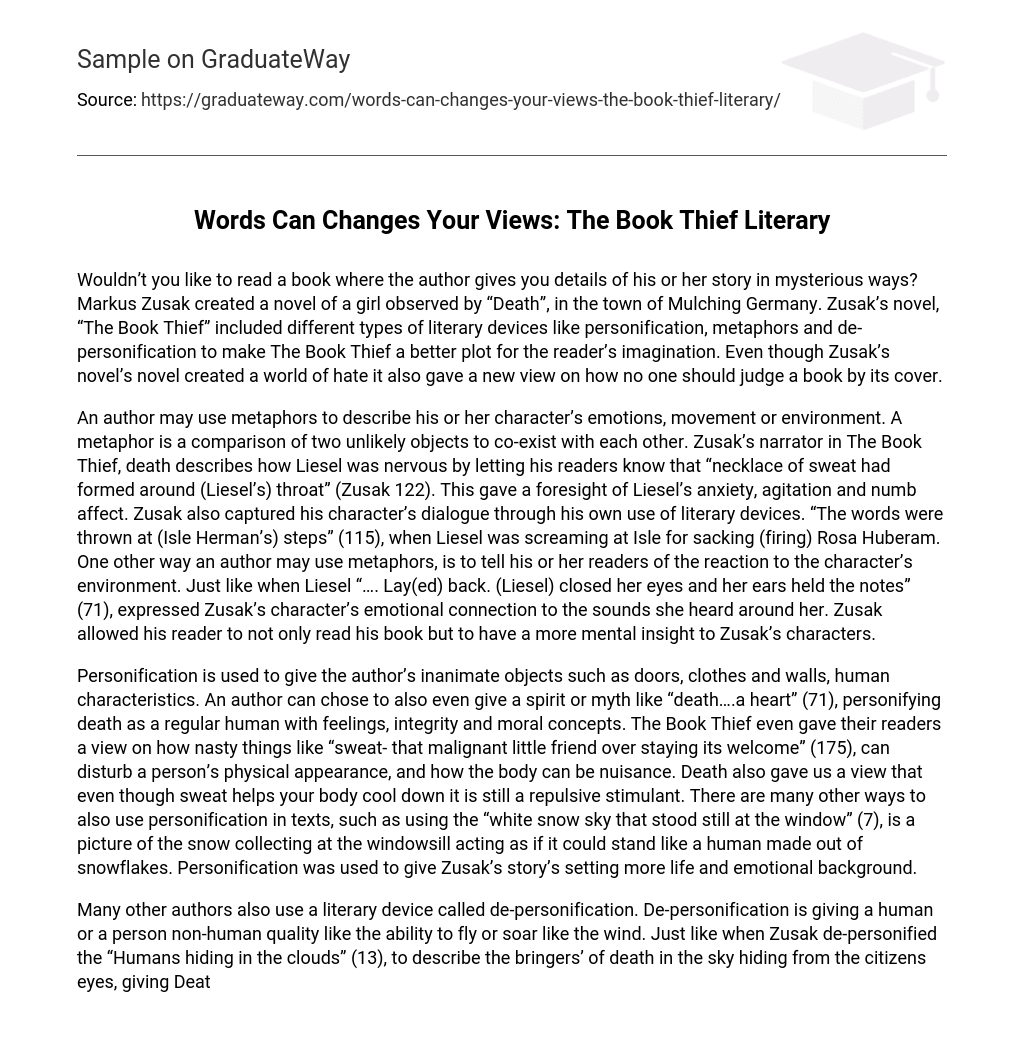Wouldn’t you like to read a book where the author gives you details of his or her story in mysterious ways? Markus Zusak created a novel of a girl observed by “Death”, in the town of Mulching Germany. Zusak’s novel, “The Book Thief” included different types of literary devices like personification, metaphors and de-personification to make The Book Thief a better plot for the reader’s imagination. Even though Zusak’s novel’s novel created a world of hate it also gave a new view on how no one should judge a book by its cover.
An author may use metaphors to describe his or her character’s emotions, movement or environment. A metaphor is a comparison of two unlikely objects to co-exist with each other. Zusak’s narrator in The Book Thief, death describes how Liesel was nervous by letting his readers know that “necklace of sweat had formed around (Liesel’s) throat” (Zusak 122). This gave a foresight of Liesel’s anxiety, agitation and numb affect. Zusak also captured his character’s dialogue through his own use of literary devices. “The words were thrown at (Isle Herman’s) steps” (115), when Liesel was screaming at Isle for sacking (firing) Rosa Huberam. One other way an author may use metaphors, is to tell his or her readers of the reaction to the character’s environment. Just like when Liesel “…. Lay(ed) back. (Liesel) closed her eyes and her ears held the notes” (71), expressed Zusak’s character’s emotional connection to the sounds she heard around her. Zusak allowed his reader to not only read his book but to have a more mental insight to Zusak’s characters.
Personification is used to give the author’s inanimate objects such as doors, clothes and walls, human characteristics. An author can chose to also even give a spirit or myth like “death….a heart” (71), personifying death as a regular human with feelings, integrity and moral concepts. The Book Thief even gave their readers a view on how nasty things like “sweat- that malignant little friend over staying its welcome” (175), can disturb a person’s physical appearance, and how the body can be nuisance. Death also gave us a view that even though sweat helps your body cool down it is still a repulsive stimulant. There are many other ways to also use personification in texts, such as using the “white snow sky that stood still at the window” (7), is a picture of the snow collecting at the windowsill acting as if it could stand like a human made out of snowflakes. Personification was used to give Zusak’s story’s setting more life and emotional background.
Many other authors also use a literary device called de-personification. De-personification is giving a human or a person non-human quality like the ability to fly or soar like the wind. Just like when Zusak de-personified the “Humans hiding in the clouds” (13), to describe the bringers’ of death in the sky hiding from the citizens eyes, giving Death a larger work load to his already undesirable job. Another example of de-personification Zusak used in The Book Thief was when his characters were in conflict or frighten by emotions. For example when “Max stood up like a struck match” (185), showed the readers a view of Max Vandenberg was frighten, astonished and startled by Liesel’s appearance. An author may also choose to de-personify one’s physical appearance, like a smile or an expression of one’s face. For example when Rudy Steiner smiled “It ran across (Rudy Steiner’s) face like a skid” (162), de-personified how Rudy was so quick at his ingenuous handy-work. Authors are capable of using literary devises to give their characters a more supernatural characteristic to the reader’s eyes.
Zusak created his little world of The Book Thief and included many subtle literary devices to give his characters a stronger mental image to the readers. The Book Thief not only gave the reader a story in a mysterious world with strange details but gave you a story of how even darkness sees a light. Zusak created a novel with the intentions to keep his readers drawn into the story devouring the reader from the first page to the final ending. The Book Thief showed there is always a light at the end of the tunnel.





